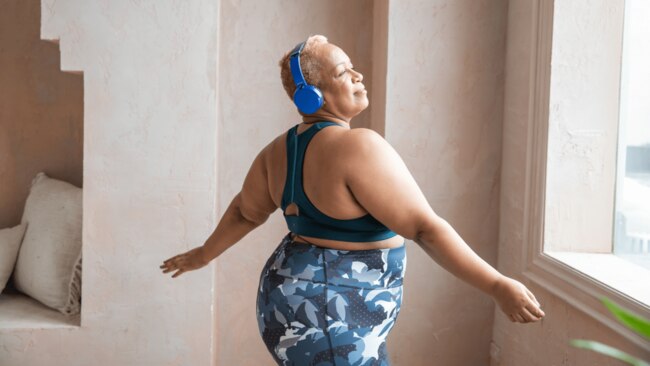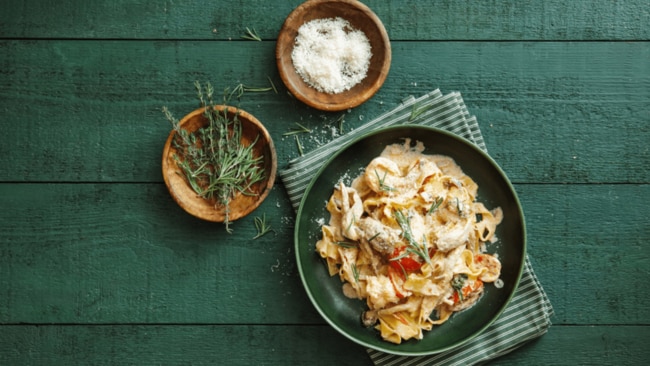The biggest lies we tell ourselves about weight loss
Let's bust some misconceptions

Lifestyle
Don't miss out on the headlines from Lifestyle. Followed categories will be added to My News.
From counting calories to skipping strength training, this expert advice will change your health thinking forever.
These days, thanks to the internet, social media and the relentless influence of diet culture, we’re so inundated with trends, tips and general information (and misinformation) about weight loss, that it’s become increasingly difficult to differentiate the credible messages from those that are just straight-up nonsense.
Everything from fast-acting fads to the latest products promising to slim and trim fill our daily scroll, making flashy promises to sell the dream of transformative weight loss. However, what we do know about effective and sustainable weight management is that it requires consistent nutritional and physical support.
Like what you see? Sign up to our bodyandsoul.com.au newsletter for more stories like this.
There is no one-size-fits-all, and finding a routine that works for your body always comes as step numero uno. As such, latching onto the latest trending quick fix or ‘miracle’ solution isn’t always the right move – particularly if it puts your individual health needs on the sideline – and it may just end up wasting your time (and money).
So, among all the assertions and advertisements, how do we know what will actually work, and what we should otherwise avoid? Here, health experts debunk the most common lies we’ve ever told ourselves (or been told) about weight loss to help separate the genuine, evidence-based facts from the falsehoods.
And, as it turns out, their advice is refreshingly clear and simple. Some might even call it life-changing.

1. Can't touch cake, but wine is fine
“We often make these trade-offs, but the reality is both cake and wine contain sugars – their effects on the body simply differ,” says accredited nutritionist, Faye James. “Cake often packs added sugars, contributing to excess calorie intake without offering significant nutrients, which is why we tend to avoid it when we’re on a diet.
“While wine contains natural sugars from grapes, it can still [derail] our weight goals. [It’s true] moderate alcohol consumption may offer potential heart benefits, but it can still disrupt sleep patterns and contribute to stress, all of which can lead to weight gain.”
Any trade-off between wine and cake will only work if you’re drinking a low amount of vino each week, adds James. “And if you fancy some cake, make a healthy one at home that’s sweetened with fruit.”

2. Counting calories is the only thing that matters
“Calorie counting can be a helpful tool in weight loss, but it’s definitely not the only thing that matters,” advises celebrity personal trainer, Jono Castano. “The quality of the calories you’re consuming, meaning their nutrient content and the types of foods eaten, also plays a significant role in your overall health and weight management.”
Translation: eating 1500 calories in the form of sugary, energy-dense foods that lack nutritional value is not going to help facilitate your weight loss goals in the same way that eating 1500 calories in the form of high-protein and nutrient-rich foods will.
“Things like a balanced diet, regular physical activity, adequate sleep, intentional stress management and practicing mindful eating habits should also be prioritised alongside monitoring your calorie intake for long-term sustainable weight loss and overall wellbeing,” advises Costano.

3. Passing on breakfast will help shift kilos
If we’re wanting to reduce calories, then surely eating two meals a day instead of three is a fail-safe way to slash your daily intake. The truth? It may just do the opposite.
“Skipping meals can lead to overeating later, making weight loss more difficult,” warns Castano. “Sustainable weight loss requires the combination of a balanced, consistent diet alongside regular physical activity and, most importantly, patience.”

4. It's ok to snack on health bars
Ready-made protein and muesli bars might be top of the convenience pops, but not all ‘healthy’ snacks are created equal. “Many contain added sugars and artificial ingredients, compromising their healthiness,” says James.
“The ideal protein source remains in wholefoods like nuts, Greek yoghurt and lean meats. When wholefoods aren’t accessible, protein bars can serve as an OK occasional snack, but eat too many and the health benefits begin to diminish. Stick to bars with recognisable ingredients and adequate protein content, with minimal added sugars.”

5. Strength training won't help you lose weight
“Strength training is just as important for weight loss as cardio,” stresses Castano. “When you do exercises like weightlifting or resistance training, you build lean muscle tissue. And the more lean muscle that you have, the higher your metabolic rate becomes, as muscle burns more calories at rest than fat.”
“Strength training can also lead to an elevated post-exercise oxygen consumption (known as EPOC), which means your body continues to burn calories at a higher rate even after your workout is completed.” So even when you’re chilling, all the resistance training you’ve been doing will supercharge your metabolism, which lends itself to maintaining a healthy body weight.

6. The only way to slim down is to give up carbs
“Carbohydrates are often misunderstood in the context of weight loss,” says James, who disapproves of this popular and ill-informed weight-loss myth. “Complex carbs like wholegrains, fruit and vegetables are essential sources of energy, fibre, vitamins and minerals, which are vital for overall health.
“Eliminating carbs entirely is neither sustainable nor healthy,” she adds. “They are necessary for brain function and muscle energy. Consuming complex carbs [such as beans, oats, quinoa, wholegrains] in appropriate portions helps stabilise blood sugar levels, prevent energy crashes and make you feel fuller for longer.” Pairing them with lean proteins and healthy fats is the best way to balance your meals and contribute to long-term wellbeing, advises James.

7. I exercised today, so I can eat whatever I want right?
Think it’s just a little treat? Um, not so fast. “Having a mindset that allows regular indulgence in unhealthy food as a reward for working out can be counterproductive when you’re trying to lose weight,” notes Castano. “Eating high-calorie ‘treats’ can easily undo all the progress made during a workout, as they often contain more calories than the amount you just burnt,” he adds. “Having a balanced approach that focuses on both exercise and mindful eating will yield more sustainable weight-loss results.”
“Eating high-calorie ‘treats’ can easily undo all the progress made during a workout, as they often contain more calories than the amount you just burnt,” he adds. “Having a balanced approach that focuses on both exercise and mindful eating will yield more sustainable weight-loss results.”

8. Detox diets will kick my weight loss into gear
“Extreme ‘detox’ diets often promise rapid weight loss by eliminating certain foods or using specific products,” explains James. “But these lack scientific evidence and can harm your body. Detox diets can lead to nutrient deficiencies, muscle loss and a slowed metabolism. And that initial weight loss often comes from water weight, not sustainable fat loss.”
What to do instead? “Instead of extreme detoxes, focus on a balanced diet rich in fruit, vegetables, lean protein and whole grains,” she recommends.

9. Eating late at night causes weight gain
We’ve all heard the old “Eat breakfast like a king and dinner like a pauper” mantra. For decades, nutrition pioneer, Adele Davis, convinced us that consuming food past 9pm was a sure-fire way to expand our waistbands. Thankfully, modern-day nutritional advice says this is yet another myth, because when it comes down to it, a calorie is a calorie – regardless of the time of day.
“Weight loss is primarily determined by energy balance, where you consume fewer calories than you burn,” says Castano. “The timing of meals doesn’t significantly impact weight loss, since it’s the total daily calorie intake that really matters.” Noted.
Originally published as The biggest lies we tell ourselves about weight loss


